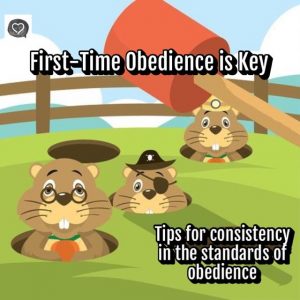Sometimes parenting can seem like playing a game of Whack-A-Mole. Like those little moles, seemingly unrelated attitudes and misbehaviors in our children can begin to pop up with increasing frequency. We deal with one, only to have another appear in another area. We scratch our heads and wonder what’s going on and why we can’t seem to get on top of things!
But perhaps those behaviors are not as unconnected as they seem. Barring major transitions or life circumstances, I have found the most common reason this occurs in our house is a failure to consistently call our children to the standard of First-Time Obedience (FTO).
By definition, true obedience is First -Time Obedience and is characterized by being:
- Immediate (Right away)
- Complete (All the way – including a sustained response over time)
- Without Challenge (A willing heart)
- Without Complaint (A cheerful heart)
Training to this standard begins in the very early years and is aided by teaching the child to give a verbal response to acknowledge he has heard and understood. A simple “Yes, Mom” or “Yes, Dad” is most common.
Immediate and complete are right actions, and without challenge or complaint are right attitudes. Training in both right action and right attitude is imperative to teaching the child true obedience from the heart.
The starting point for training a child in FTO is teaching him to come to the call of his name and giving the right verbal response. This response should be transferred to all situations in which I speak my child’s name to gain his undivided attention for the purpose of instruction, or even simply giving information. After receiving instruction, the child is taught to give a verbal response to show he has heard and understood, indicating his intent to obey.
I have found time and again that when one or more of these standards are allowed to lapse, I end up playing another round of Whack-A-Mole.
So where are we getting off track? Here are a few ways we can slip in being consistent in the standards of obedience.
- We compartmentalize and underutilize this training and only use it as a means of getting a child into the room. We fail to transfer this concept to all areas of instruction.
- We don’t enforce the correct verbal response. We allow our children to say, “What?” when called or “Ok,” instead of “Yes, Mom”. Or worse, we end our instructions with, “Okay?” which makes them sound like suggestions or options that the child agrees to if he chooses.
- We don’t separate the call from the command. (I learned this from my good friend, Carla Link.) When we fail to call a child to obedience before we give the instruction, we cloud the issue. Are they not following through out of a rebellious heart, or because they don’t enjoy the task? The call tests their readiness to obey and then I don’t confuse disappointment or reluctance over a given task with defiance. This changes how I respond and correct.
- We repeat the call instead of requiring a response the first time. We fail to follow through on giving a consequence for this and give a reminder instead.
- Our FTO training is incomplete. We give consequences for wrong actions but only remind or admonish for wrong attitudes. This fails to get to the heart of the child.
When we fall into any of these habits or our training in any area of FTO is incomplete, we begin to see those pesky little moles cropping up.
Just as the center hub of a bicycle wheel gives stability to the spokes and keeps the wheel round and rolling along, so FTO is the hub of our parenting, supporting the structure of all our training. It is the foundational principle upon which all other aspects of training our children rest. How can we expect to teach them anything effectively if we have not first established our right to speak into their lives? There is no point in giving instruction to a child with an unwilling heart. When the hub of FTO is damaged or missing, the other spokes of training falter and our “wheel” is out of shape and no longer as effective at helping us to reach our goals. Most parents report that getting back to FTO in their homes results in sweeter attitudes and those other behavior issues seem to resolve on their own without much additional effort. Rightly responding to the call to obedience impacts every area in a child’s life.
FTO training is key to getting to the heart of our children. It is the means by which we gain their attention so that we can teach them in the ways of the Lord. To call them to true obedience is to prepare their hearts to submit to the Lord and His call upon their lives. Our goal is to one day see our children transition from obedience to submission, ultimately serving the Lord out of a heart of devotion. When we compartmentalize our training or inconsistently call our children to the standard, we hinder any true or lasting impact. FTO is critical, and we need to see this as the starting point for all instruction.
Beth Ann Plumberg is a Contact Mom for Christian Family Heritage. She is wife to Chuck, mom to four grown boys and 3 daughters-in-love and grandma to 3 precious babies. Chuck and Beth Ann are active in their local church discipling young parents and leading classes.





Leave a Reply